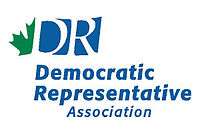Democratic Representative Caucus
Democratic Representative Caucus | |
|---|---|
| Former federal party | |
 | |
| Leader | Chuck Strahl |
| Founded | 2001 |
| Dissolved | 2002 |
| Ideology | conservative |
The Democratic Representative Caucus was a group of Members of the Canadian Parliament who left the Canadian Alliance in 2001 in protest against the leadership of Stockwell Day. Following the Alliance's disappointing performance in the 2000 election, Day came under severe criticism from his own party. Several high-profile Alliance MPs began publicly calling for him to step down. Through the spring of 2001, several members of the Alliance resigned their shadow cabinet seats, the most high-profile resignation being that of deputy leader Deborah Grey.
On May 2, Art Hanger was the first Alliance MP suspended from caucus for criticizing Day. Over the next two months, 11 other Alliance MPs were either suspended from caucus or resigned. On May 16, Hanger was followed by Chuck Strahl, Gary Lunn, Jim Pankiw, Val Meredith, Grant McNally, Jay Hill and Jim Gouk. In late June, they were joined by Monte Solberg, Andy Burton and Brian Fitzpatrick, and in the first week of July by Inky Mark and Grey. Through the summer, this group of MPs sat as "Independent Alliance Caucus", and were jokingly dubbed the "Rebel Alliance" by political commentators.
In early September, an offer was made to the MPs in which they would be readmitted to the Alliance caucus if they promised to refrain from criticizing Day's leadership. The MPs surveyed their constituents, and on September 10, the offer was accepted by Hanger, Gouk, Solberg, Fitzpatrick and Burton. The remaining seven MPs refused, and formed the Democratic Representative Caucus on September 12, with Strahl as its parliamentary leader and Grey as deputy leader. This was not intended as a new political party, but simply as a group caucus.
Coalition with the Progressive Conservatives
Two weeks later, on September 24, the DRC members entered into a coalition with the Progressive Conservatives, known as the "Progressive Conservative - Democratic Reform Coalition Caucus." Strahl was named deputy leader of the coalition caucus, with Grey as caucus chairwoman. The PC-DRC Coalition was intended to be PC leader Joe Clark's framework for proving that the two parties could be united on his terms rather than Day's. Clark and Strahl tried to propose common policies that would appeal to both PC and Alliance members.
While the DRC members insisted that they remained loyal to the Canadian Alliance despite their opposition to Day's leadership, the group founded the Democratic Representative Association (DRA), presumably to support their re-election campaigns as DRC Members of Parliament.
On November 19, Lunn left the DRC to rejoin the Alliance shortly after Day agreed to hold a new Alliance leadership race.
End of the coalition
In March 2002, Day lost that leadership race to Stephen Harper, and on April 10, five of the seven DRC members returned to the Alliance caucus, terminating their coalition agreement with the PCs after Clark rebuffed Harper's attempts to seek a greater union between the Alliance and the Tories. The DRA was disbanded.
Mark chose not to return to the Alliance caucus, instead sitting as an Independent Conservative, then joining the PC caucus in early 2003.
Pankiw's request for readmission to the Alliance caucus was denied, as he was embroiled in a political scandal involving a violent confrontation with an aboriginal constituent. He ran for mayor of Saskatoon, in 2003, while still sitting as an independent MP, and again attracted controversy because his home was in fact outside of Saskatoon's city limits and not in the city's Forest Grove area as he claimed on his application.
Conservative Party of Canada
Clark's successor, Peter MacKay, negotiated a merger with the CA in late 2003, and he, along with Mark and most of the PC caucus, joined with the CA caucus to form the Conservative Party of Canada, fulfilling the DRC's main goal of a unified centre right. But, Clark and a few other prominent PC MPs and senators refused to join the new party, whilst Pankiw was again refused admission along with another Saskatchewan CA MP, Larry Spencer.
In 2004, Grey, having retired from politics, noted in her published political memoirs that the PC-DRC's full name was constantly misreported by the press, political commentators and the media. The official title of the coalition was "Progressive Conservative - Democratic Reform Coalition Caucus" as opposed to Representative.
See also
![]() Conservatism portal
Conservatism portal